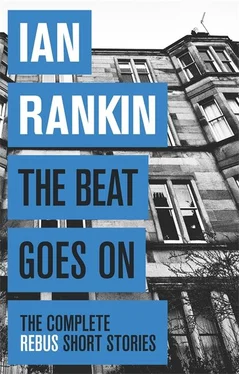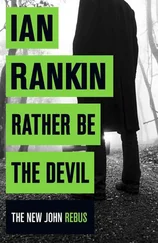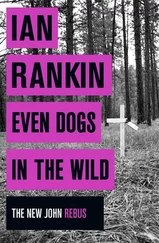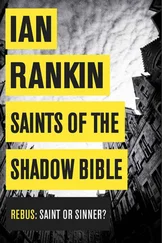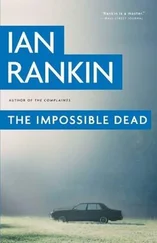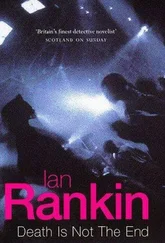‘Go on then — tell me.’
‘Joseph Cropper didn’t have a daughter. You told me he did because you knew fine well it would jar if I ever did any digging. I’d start to wonder why you told that particular lie. He had a wife, though, younger than him.’ Rebus showed Simms a copy of the photo from the cemetery. ‘See how her husband’s keeping a grip on her? She’s either about to faint or he’s just letting everyone know who the boss is. To be honest, my money would be on both. You can’t see her face, but there’s a photo she sat for in a studio...’ He slid it from the folder.
‘Very pretty, I think you’ll agree. This came from Douglas Cropper, by the way. Families keep a lot of stuff too, don’t they? She’d been at school with Johnny Watt. Johnny, with his eye for the ladies. Joseph Cropper couldn’t have his wife causing a scandal, could he? Her in her late teens, him in his early thirties...’ Rebus leaned across the bar a little, so that his face was close to that of the man with the sagging shoulders and face.
‘Could he?’ he repeated.
‘You can’t prove anything, you said as much yourself.’
‘But you wanted someone to find out. When you found out I was a cop, you zeroed in on me. You wanted to whet my appetite, because you needed to be found out, Albie. That’s at the heart of this, always has been. Guilt gnawing away at you down the decades.’
‘Not down the decades — just these past few years.’ Simms took a deep breath. ‘It was only meant to be the frighteners. I was a tough kid but I wasn’t big. Johnny was big and fast, and that bit older. I just wanted him on the ground while I gave him the warning.’ Simms’s eyes were growing glassy.
‘You hit him too hard,’ Rebus commented. ‘Did you push him in or did he fall?’
‘He fell. Even then, I didn’t know he was dead. The boss... when he heard...’ Simms sniffed and swallowed hard. ‘That was the both of us, locked together... We couldn’t tell. They were still hanging people back then.’
‘They hanged a man at Perth jail in ’48,’ Rebus acknowledged. ‘I read it in the Scotsman .’
Simms managed a weak smile. ‘I knew you were the man, soon as I saw you. The kind who likes a mystery. Do you do crosswords?’
‘Can’t abide them.’ Rebus paused for a mouthful of IPA. ‘The money was to hush you up?’
‘I told him he didn’t need to — working for him, that was what I wanted. He said the money would get me a clean start anywhere in the world.’ Simms shook his head slowly. ‘I bought the house instead. He didn’t like that, but he was stuck with it — what was he going to do?’
‘The two of you never talked about it again?’
‘What was there to talk about?’
‘Did Cropper’s wife ever suspect?’
‘Why should she? Post-mortem was what we had to fear. Once they’d declared it an accident, that was that.’
Rebus sat in silence, waiting until Albert Simms made eye contact, then asked a question of his own. ‘So what are we going to do, Albie?’
Albert Simms exhaled noisily. ‘I suppose you’ll be taking me in.’
‘Can’t do that,’ Rebus said. ‘I’m retired. It’s up to you. Next natural step. I think you’ve already done the hard part.’
Simms thought for a moment, then nodded slowly. ‘No more ghosts,’ he said quietly, almost to himself, as he stared up at the ceiling of the sample room.
‘Maybe, maybe not,’ Rebus said.
‘Been here long?’ Siobhan Clarke asked as she entered the Oxford Bar.
‘What else am I going to do?’ Rebus replied. ‘Now I’m on the scrapheap. What about you — hard day at the office?’
‘Do you really want to hear about it?’
‘Why not?’
‘Because I know what you’re like. Soon as you get a whiff of a case — mine or anyone else’s — you’ll want to have a go at it yourself.’
‘Maybe I’m a changed man, Siobhan.’
‘Aye, right.’ She rolled her eyes and told the landlord she’d have a gin and tonic.
‘Double?’ he asked.
‘Why not?’ She looked at Rebus. ‘Same again? Then you can make me jealous by telling me stories of your life of leisure.’
‘Maybe I’ll do that,’ said Rebus, raising his pint glass and draining it to the very last drop.
‘Male hero (a policeman?)’
That was my first note to myself, dated 15 March 1985, about the character who would eventually become Detective Inspector John Rebus. I was twenty-four years old and a postgraduate student at the University of Edinburgh. I was living in a shared apartment with two other — female — postgrads in Arden Street. I’d been in the city six and a half years, and still I couldn’t fathom the place. My doctoral thesis was concentrating on the novelist Muriel Spark, and through her I was beginning to investigate the Edinburgh of the imagination. In Spark’s most celebrated work, The Prime of Miss Jean Brodie , Miss Brodie is a descendant of William Brodie, a real historical character. William Brodie was a deacon of the city, a councillor, cabinet-maker and a man who lived a double life. Respectable and industrious by day, by night he led a masked gang into the homes of his victims, robbing them of their valuables. Brodie was trying to fund his lavish lifestyle (including a couple of demanding mistresses), and had diversified into lock fitting, meaning he had little trouble gaining unlawful entry. When caught and found guilty, he was hanged on a scaffold he had helped to modernise as part of his daily profession.
Deacon Brodie provided the template for another great character from Scottish literature — Robert Louis Stevenson’s Dr Henry Jekyll. Muriel Spark was a huge fan of Stevenson, and my research took me to The Strange Case of Dr Jekyll and Mr Hyde . The idea of the doppelganger had been explored before, however, in James Hogg’s Confessions of a Justified Sinner... so I had to read that book, too. At the same time, I was becoming fascinated by contemporary literary theory, enjoying the ‘game playing’ aspect of storytelling. Eventually, I would name my own fictional detective after a type of picture puzzle, and the mystery in his first adventure would be solved with the help of a professor of semiotics.
That’s the problem with Knots and Crosses (and one reason I find it hard to read the book these days) — it is so obviously written by a literature student. Rebus reads too many books and even quotes from Walt Whitman — a writer whose works he really shouldn’t have known. He is overly literate, perhaps because I didn’t quite know him. I was twenty-four and knew little enough of life outside the confines of academia. I certainly didn’t know what it would be like to work as a cop. The plot of Knots and Crosses demanded that Rebus be a seasoned pro, so I made him forty years old. He’s separated from his wife and has a young daughter. Really, this guy was unlike me in so many ways, and our one resemblance — that love of literature — made him less than realistic.
It seems to me now that I wasn’t interested in Rebus as a person — he was a way of telling a story about Edinburgh, and of updating the doppelganger tradition. Knots and Crosses was self-consciously based on Jekyll and Hyde , just as a later Rebus novel, The Black Book , would use Justified Sinner as its starting point. The thing is, I’d always been a bit of an outsider/doppelganger, always tried to present several faces to the world. I’d grown up in a fairly tough neighbourhood — a town of 7,000 inhabitants, which had existed only as a hamlet and a couple of farms until coal was discovered at the start of the twentieth century. That’s when my grandfather shifted the family east from the Lanarkshire coalfields. Houses were constructed quickly — and cheaply — to house the new labour force. There wasn’t even time to think up names for the streets, so they just got numbers instead. My dad, the youngest of seven, didn’t work down the mines, but all his brothers did. By the time I came along, however, the coal was running out. The klaxon which signalled the start of each new shift fell silent one day, and that was that. Not that I took much of this in, being too busy living a completely separate life inside my own head.
Читать дальше
